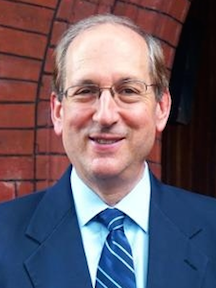Autumn, captured beautifully on the front cover from our new chapter campus at the University of North Carolina at Charlotte, represents the beginning of the academic year. Every fall carries that association, often of a particularly important academic year in our lives. This is a time of new possibilities and widening horizons. Taking a class or meeting a mentor can be a life-changing experience.
On my podcast, Key Conversations with Phi Beta Kappa, I often ask my guests about such an experience. One of my favorite stories came from Princeton University sociologist Marta Tienda. She has written extensively about equity and access to higher education and lectured about the consequences of underinvestment in public education. But all this was hardly the foreseeable path in her youth. Her parents each had less than a third-grade formal education in Mexico. Their aspiration for her was merely that she should graduate from high school. She shared a memory of a seventh grade teacher, a memory so vivid that she remembered her name (Mrs. Miller) and what she was wearing that day (a navy-blue sweater and pearls). During the podcast, Dr. Tienda related their dialogue on a day that was to change her life forever: Mrs. Miller asked, “‘What are you going to do when you finish school?’ I said, ‘I’m going to be a beautician.’ She said, ‘Why?’ I said, ‘Because I fix people’s hair on my street … they like it and they pay me for it.’ She said, ‘But you could go to college.’ And I said, ‘That’s for rich people.’ And she said, ‘You can get a scholarship.’ And I thought, ‘I can?’ She said, ‘Yes, you can earn a scholarship.’ And … that was transformative. One teacher, one conversation that raised my aspirations … suddenly that was on my radar screen: college.” Suddenly college was on her radar. Mrs. Miller’s mentorship would eventually lead Marta Tienda to graduate school and to a distinguished academic career.
It is hard to overstate the importance of mentors in our lives. Mentoring is an important part of the fabric of Phi Beta Kappa today. The annual Key into Public Service (KIPS) convening in Washington, D.C., includes mentoring sessions for each of the 20 KIPS scholars. The annual Key Connections events, launched with a national program in September and followed up by local alumni association events through October, include opportunities for new ΦΒΚ members to meet and learn from more experienced members. Many of our associations have mentoring programs, which represent an important aspect of the lifelong membership experience of belonging to Phi Beta Kappa for all involved—mentee and mentor alike.
The mentoring that takes place on each of our campuses every day has never been more crucial. After several years of education challenged by the Covid pandemic, the need for mentors to help fill resulting gaps will be greater than ever. As Marta Tienda experienced, the best teachers, by allowing their students to imagine new possibilities, are among our most influential mentors. And beyond campus, our members working in their respective fields help young aspiring professionals make the leap to meaningful careers. Ralph Waldo Emerson (ΦBK, Harvard College) said, “Our chief want in life is somebody who will make us do what we can.” To be part of the great continuum of liberal arts education, and the quarter-millennium of the life of Phi Beta Kappa, is to have the opportunity to be mentored and the honor in turn to mentor others.
Frederick M. Lawrence
Secretary and CEO




